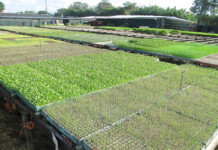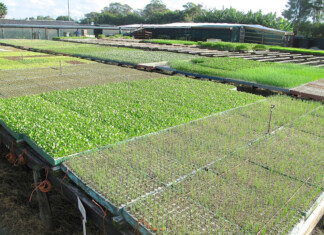Moving to France and renovating a countryside fixer-upper with a French husband is the stuff of romcoms and romantic novels, but for East Londoner Liesl Soulard it is lived reality.
Soulard, 28, had no idea that a teaching stint in France seven years ago would change her life dramatically.
The English teacher now spends her free time fixing chimneys, jack-hammering floors and clambering on a crumbling roof in a safety harness.
“I had French as an additional module at university,” said Soulard, who matriculated at Grens High School (now Ooskus Gimnasium) before obtaining a BA in English and psychology at North-West University.
“I was offered the opportunity to participate in a programme where you can work as an English assistant for the French national education system.
“I never planned on staying in France forever. However, life had different plans.
“I met Jérémy in my first year in France and the rest is history.”

She met her chemical engineer husband on the Dune du Pilat in 2019 and married him in a civil ceremony in Gradignan, Bordeaux, in April 2022, before flying home to SA for a religious ceremony four months later.
In 2024, the couple and their Belgian Malinois, Mike, and cats Cinder and Grisou, moved into a neglected 1850s farmhouse with its see-through roof and no foundation and began the gargantuan task of restoring it into a safe and beautiful home.
Weekender asked her:
Q: Was it a romantic notion that made you buy a rundown farmhouse and did you specifically want to live in the countryside?
A: We bought the farmhouse in the Maine et Loire, which is the same little village where Jérémy grew up.
After growing up in the countryside, he found life in the big city difficult, so we always knew we wanted a quiet life in the countryside.
We never planned on buying a house in 2024, but life is full of opportunities and surprises.
We played the game ‘guess which house in the village’ with Jérémy’s parents, who were also born and bred in the area, and our house was the only one they couldn’t identify.
Purely out of curiosity, and after a lot of convincing, Jérémy agreed to my well-known request — ‘we’re only going for a look and not to buy’.
When we stopped in front of the house, it was love at first sight. And that was that.

Q: What did your family and friends in East London say when you told them you were buying a fixer-upper in France?
A: They all were — and still are — over the moon. They eagerly await the photos and videos of our progress and offer praise along the way.
I phone them almost on a daily basis to make them part of the journey, and I’m looking forward to my parents’ visit in July.
I tell them it’s because I miss them, but it’s equally about their promised help with the house.
Q: Have you perhaps read and been inspired by Peter Mayle’s 1989 memoir, A Year in Provence?
A: Yes, we have! I fell absolutely in love with Peter Mayle’s book, to such an extent that Jérémy organised a weeklong holiday for us in Provence — in the same village where Peter Mayle lived.
Q: Please describe the farmhouse — the state it was in when you moved in, how old it is and what you know of its history.
A: The house consists of two parts, built at different times. The oldest part was probably built around the 1850s, while the second part was definitely built in the 1970s.
What we do know of the property is that multiple farm tenants lived here and farmed the surrounding fields for the owner at some point, and the last owner had lived there from 1974 until she sold it to us.
In terms of the state of the house, let’s just say it very much lives up to the name fixer-upper.
The roof leaks, and you can see the sky through the roof tiles.
There are no foundations, no insulation, and only single-glazed windows.
The older part of the farmhouse has four rooms, and an attic, and the “new” part, five rooms.
We also have a barn, stables, and a few other farm buildings along with 5,000m² of land.
Q: Do you both have full-time jobs?
A: We both have full-time jobs, and then renovate the house after work and on weekends.
Jérémy works as a software installation and maintenance engineer for a few laboratories in Nantes, and I’m an English teacher.
It takes a lot of motivation to pick up a hammer after having worked a full day, but let’s just say: the lack of heating during winter and early spring means we are highly motivated to take care of business — even if we are wearing layer upon layer to keep warm.

Q: What is the biggest and most expensive challenge?
A: The roof! It probably makes up about half of all the renovation costs as the wooden frame has to be realigned and the roof has to be completely replaced.
This has also been a bit of a logistical nightmare, because the roof essentially needs to be the last ‘big thing’ we do structurally, and therefore we have to sort many things — in a particular order — before we can get to it.
Also, the company we’ve hired to do the work can only work on the roof over a period of three summer months, and only if there aren’t heavy rains.
Due to inclement weather last year, they also have a significant backlog, so we have to navigate all of that, organisationally.
So, if we are delayed in any of the preceding steps, the roof will have to wait another nine months. The pressure is on!
Q: Do either of you have any experience in home renovation?
A: No, none at all! But luckily, all Jérémy’s family members are very handy at construction, seeing as they have all built their own homes from scratch.
However, our house is also a challenge for them, as none have done a home renovation before. And this one requires a lot of outside-the-box thinking.
Q: What are you realistically able to tackle yourselves?
A: We have arranged for professional help at various points in the renovation process. However, we are in charge of the demolition and preparation of the house before the builders can take over.
A few examples of what we have to do: sandblast the wooden beams of the roof, remove the attic’s floor, put in a 300kg wooden beam, remove the roof tiles and rotten wood, as well as deconstructing the two chimneys.
So far, we’ve demo-ed the floor with a jack hammer, dug the foundations with an excavator, and broken out the interior walls.
We’re currently working on the chimneys, clambering all over the roof with safety harnesses.
Q: Have you employed any artisans, how is that going? Do you speak French and if not, how do you communicate with builders?
A: Yes, we have four artisans that will work on the house from April — a mason, a plumber-electrician, a carpenter-joiner, and a plasterer.
They are very reliable and informative, answering any and all questions that we have with frank assessments and practical know-how.
Even though I do speak French, I don’t have French construction vocabulary at all.
Luckily, the artisans know that French is my third language, and they are very patient in explaining everything.
Jérémy and my father-in-law also help me to improve my vocabulary in this regard.
Q: What is your interior decor aesthetic?
A: We are huge fans of the old-fashioned French country-life style, so we’re trying our best to keep the charm and authenticity of the house while also modifying it for our personal taste and comfort.
Q: How long will the project take?
A question we ask ourselves daily. In the words of my father-in-law: “A house like this is never done. There is always something to do.”
However, what we consider to be the big work will hopefully be finished by the end of this year.
After that, we move on to renovating the second part of the house.
Once that’s done, the old farm buildings are begging for some TLC, so onward and upward.
Q: What is it like to live in the house during the renovation process?
A: We’ve split the renovation into two parts, and we’re currently living in the “newer” section and completely gutting the older one.
The eventual plan is to complete the renovations of the older section, and then to move into the newly renovated section to fix up the remaining part.
So, we’re currently making do while also having our three pets with us.
We had to install a shower in our water pump room, which has absolutely no insulation and is freezing in the mornings and in the evenings.
We also had to disconnect our wood-burning heating system — an unfortunate necessity that led to us without heat in the middle of winter.
Just as a point of reference, early mornings are marked by seeing our breath fogging as we share a coffee in our freezing kitchen.
Q: What have you accomplished so far and have there been any catastrophes?
A: So far, we’ve demo-ed the floors and dug the foundations and we’ve taken down two chimneys.
We’ve also rewired the electric board with a lot of help from my brother-in-law, as well as removing the wood-burning heater which weighs 300kg.
All the electricity and water pipes have been disconnected, and though there have been a few leaks, it’s nothing we can’t handle.
The only catastrophe I can think of is when our cats discovered a snake in the house last summer and that time Mike escaped from our garden and “visited” our neighbours.
One minor difficulty was the excavator breaking down, so we had to dig the rest of the foundations by hand.
Q: Will you be farming perhaps or do you have plans to run a B&B?
A: At some point we would like to have a few farm animals like sheep, cows and chickens, but more in the sense of partial homesteading.
Eventually, if all goes well, we hope to convert the farm buildings into self-catering cottages.
Q: You are inviting people to follow your progress on social media. On what platforms can they follow you?
A: After plenty of nagging, aka “encouragement”, from my sister, we decided to create a Facebook and Instagram account so that all our family and friends can follow our journey, as it’s quite difficult to keep everyone up to date with phone calls and messages.
Then we thought: why not share the experience with others as well? It’s sometimes a very fulfilling experience to live vicariously through someone else and appreciate the hard work that goes into making people’s dreams come true.
If anyone is interested in following our renovation adventure and our life in the French countryside, they’re more than welcome to like our Facebook page or follow our Instagram account at LaBaudrêve.
Q: Do you have any advice for those inspired by your renovation?
A: Nothing ever really goes to plan, and you discover plenty of surprises — good and bad — along the way. The key is to be adaptable and extremely patient.
Weekender








